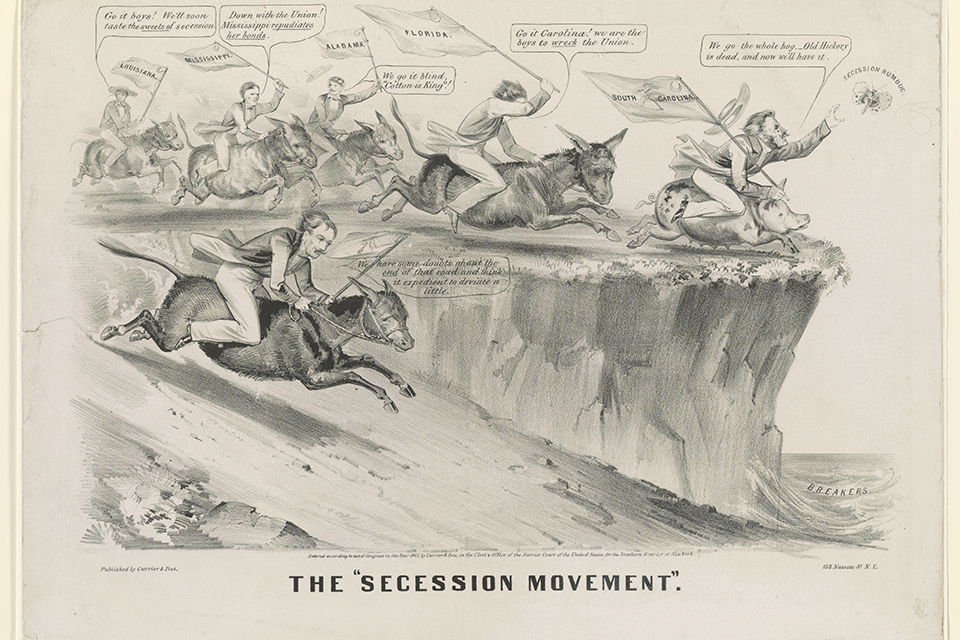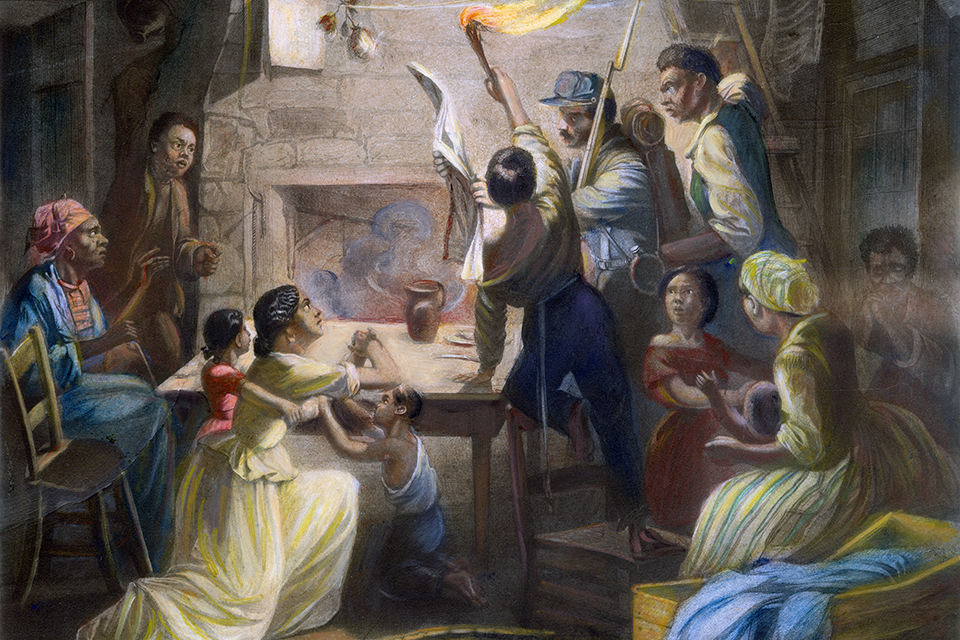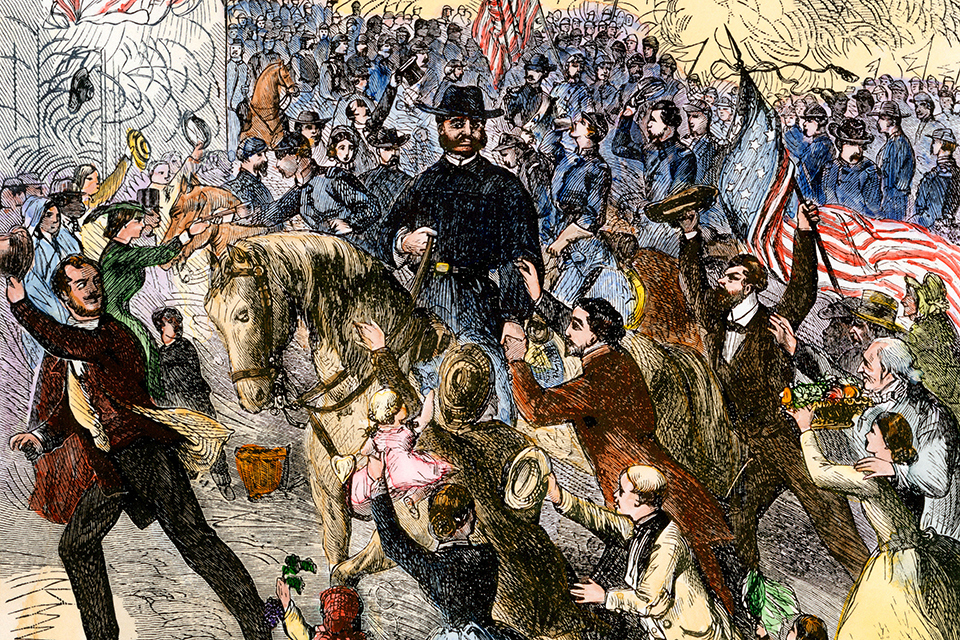[divider_flat]Yankees argued that rich Southerners duped and even terrorized regular people into supporting secession
[divider_flat]In Armies of Deliverance: A New History of the Civil War (Oxford, 2019, $34.95), Elizabeth R. Varon offers a new interpretation of Northern Civil War rhetoric. While the standard narrative emphasizes the Union’s turn to “hard war” against the Confederate populace and infrastructure, Varon, Langbourne M. Williams professor of American history at the University of Virginia, argues that Northerners saw the war as a crusade to deliver the “deluded Southern masses” from domination by a minority elite of slaveholders indifferent to their needs. The rhetoric of deliverance, central to African-Americans’ campaign for freedom and civil rights, extended the benefits of emancipation to whites who would enjoy new opportunities for education, prosperity, and a voice in political affairs if the slaveholding elite were removed from power.
-

Elizabeth R. Varon What did deliverance mean to Northerners who talked about it? Historians have this longstanding debate about Northerners’ motivations for fighting the Civil War: whether it was fought for restoration of the Union or abolition of slavery and whether the primary motivation shifted from one to the other over time. In fact, there was a broad spectrum of beliefs among Northerners about war aims. On one end of the spectrum there were radical abolitionists who envisioned an interracial society and on the other there were conservatives who were hostile to abolition but believed the Union should be restored. I was curious about what enabled those people to find common ground and form a coalition to defeat disunionism. I found that the theme of deliverance came up again and again in political rhetoric and arguments. Many Northerners imagined the Civil War as a battle waged to deliver the South from the clutches of the “Slave Power,” a conspiracy of elite slaveholders who held disproportionate sway over national politics and who had duped, bullied, and even terrorized non-slaveholding white Southerners into supporting the project of secession. Deliverance was an expression of an idealistic view of the Union, popular among Northerners at this time, that saw America as bound together by consent and affection, not force and coercion. Northerners felt that in order to win the war they had to do more than compel Confederates’ submission. They had to win Southerners over and restore their love of the Union.
-

This Northern cartoon shows Southern leaders riding hellbent off a secessionist cliff. (Library of Congress) Who was the audience for deliverance rhetoric and how was it promoted? This “deluded masses” narrative was ubiquitous in the North. It was publicized in major periodicals such as Harper’s Weekly and Frank Leslie’s Illustrated Newspaper. It was in newspapers such as the moderate Republican New York Times and the Democratic New York Herald. You saw it in sermons and iconic speeches by Edward Everett and Abraham Lincoln. I was struck by how often the notion that the war’s purpose was to save Southerners from secession appeared in soldiers’ letters and diaries. Such rhetoric often cast Southern whites as errant brethren and prodigal sons who should return to the national family.
- How did Southerners react to deliverance rhetoric? From the very start, Southerners argued that Yankees were waging a ruthless, remorseless war of conquest and extermination. Southerners did this in part to discredit any Northern attempts to argue that Unionists were fighting in the best interests of the Southern people.
- When the Union army occupied New Orleans, how did the deliverance narrative play out? Confederates portrayed Union occupation commander Gen. Benjamin Butler as a “beast,” but Butler imagined himself a liberator of Southern victims of the Slave Power. He instituted policies aimed at winning Confederate hearts and minds, such as distributing rations to the poor and hiring unemployed workers to clean the streets. He wanted to disenthrall the masses from their subservience to the elite. Eventually, however, Butler and other occupying commanders came to see that their efforts to win Southerners over didn’t really work. The people who said they were loyal Unionists often acted in self-interest, not as a result of a true change of heart.
-

1864 engraving shows a Northern soldier reading the Emancipation Proclamation to a joyful black family. (Sarin Images/Granger) Did white Northerners’ deliverance narrative apply to African Americans? African American abolitionists such as Frederick Douglass emphasized that black people played a crucial role in their own deliverance. Hundreds of thousands of slaves ran away to Union lines. About 200,000 African American men enlisted in the Union army and navy. Douglass and other black leaders argued that the war was not only about delivering slaves from bondage, it was more broadly about delivering the nation from the sins of slavery and persistent racial discrimination.
- Wasn’t emancipation intended as a punishment for Southern whites? In the standard narrative, Lincoln’s emancipation policy was driven by the decision to take off the kid gloves and take away Confederate assets, namely slaves. I’m making a different argument. To a surprising degree, Lincoln and his allies justify emancipation as something that will redeem the South, not just punish it. A great deal of Northern rhetoric is devoted to making the case that emancipation will benefit white Southerners by encouraging economic development, education, and democracy.
- Explain how Grant’s magnanimous surrender terms to Lee at Appomattox reflected the deliverance sentiment. Building on Lincoln’s own generous amnesty policy, Grant wanted to speed reunion and change Southern hearts and minds. What we find, of course, is that Grant is disappointed. He soon sees the writing on the wall that ex-Confederates are still defiant, and that they’re not going to repudiate their leaders and accept peace on the North’s terms.
- Andrew Johnson employed deliverance rhetoric in laying out his framework for a lenient Reconstruction. In Johnson’s interpretation of Lincoln’s legacy, the Confederate states had never left the Union and should be swiftly restored in a spirit of forgiveness. Johnson argued that the deluded masses of white Southerners who had been the victims of the Slave Power were being victimized, after the war, by the Radical Republicans. Johnson revived the zero-sum game thinking that wartime defenders of emancipation had rejected. He claimed that if Radical Republicans extended citizenship to black, then whites would suffer and their rights would be diminished.
- Conversely, the Radical Republicans used the deliverance framework to argue that the defeated states had to throw off the stain of secession. Radical Republicans cast emancipation as something that would hurt some Southern whites in the short term but be beneficial in the long term: there would be some pain involved in the transition from slavery to freedom but the ultimate goal was redemption and healing. Republicans tried to reach out to the white Southern masses. For example, through the Freedmen’s Bureau the Republican Congress extended humanitarian relief to white Southerners, ex-Confederates included. But deliverance arguments were more difficult to make after Johnson’s appeasement of the old rebel elite restored their power in the South.
- You undertook the daunting task of writing a Civil War history in one volume. Who is the audience for this book?This book is aimed at general readers who want an accessible narrative that draws on the best modern scholarship, interweaves battle front and home front stories, and unfolds chronologically, capturing the human drama and uncertainty of the war.





